While I recognize the professionalism and academic success of this StMU Research Scholars project and the types of articles published in the project, I decided on a unique approach to my scholarship. The following journal entries are the voice of a quarter from the year 1854 as it travels around our nation’s capital (and other places when necessary) during the whole of the year 1854. The quarter will witness many of the historical events from that year, including the debates around the Kansas-Nebraska Act, the connection of Texas to the rest of the US by telegraph, the formation of the Republican Party, and the death of an important historical matriarch. I have provided citations for all historical events; and for recreations of events that are my interpretations of unknowable encounters, I make clear that they are my interpretations. A great man once said that “imagination is its own form of courage.” I invite you to approach this article with an open mind and an open heart. Enjoy.
– Matthew J. Tobar
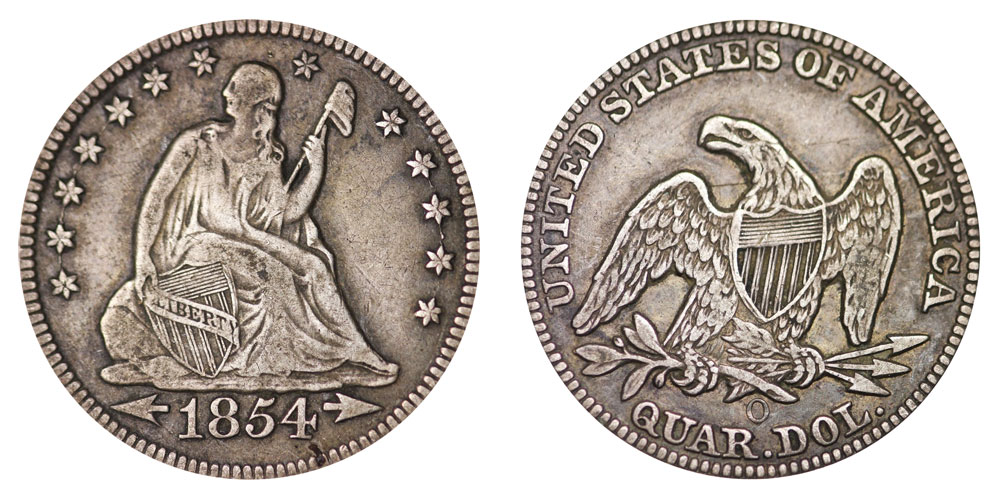
Below is the long-lost journal of a Seated Liberty quarter from the year 1854. This quarter spent the majority of its first year in Washington DC. This quarter spent its time almost exclusively with Congressmen and Senators and was present for many historical events in the history of our great nation from that year. Over the ravages of time, many entries of this journal have been lost, along with the quarter. Recently, the quarter was discovered, along with the surviving journal entries. While entire dates were lost to the water, below are the complete dates that were recovered.
January 1
I fell onto a belt, out of a cloud of steam. I didn’t know what was going on. Someone grabbed me, looked at me, then rolled me up (thankfully I was at the top of the roll), put me in a box, and put me on a stagecoach. All I knew was that we quarters were headed to DC and that we would be there by morning.1
January 3
Wow, a lot has happened, and I have been so busy I could not write yesterday. Let me catch up. I arrived at a bank in DC first thing in the morning. I was there for a few hours, then the owner of a tavern came and exchanged some bills for some rolls of coins. I was one of the rolls of quarters that were brought up front for him to take to the tavern. Late at night at the tavern, someone very famous appeared to have entered the room. It was someone by the name of Senator Houston (or Sam, depending on who was talking to him). He came in and ordered some bitters. His wife wouldn’t allow him to drink anymore, so bitters were now the only way he could consume alcohol. When he paid off his tab so he could go home, I happened to be one of the quarters he got back in change and got placed in his coin bag. He went back to his office on Capitol Hill, that way he could get some peace.2
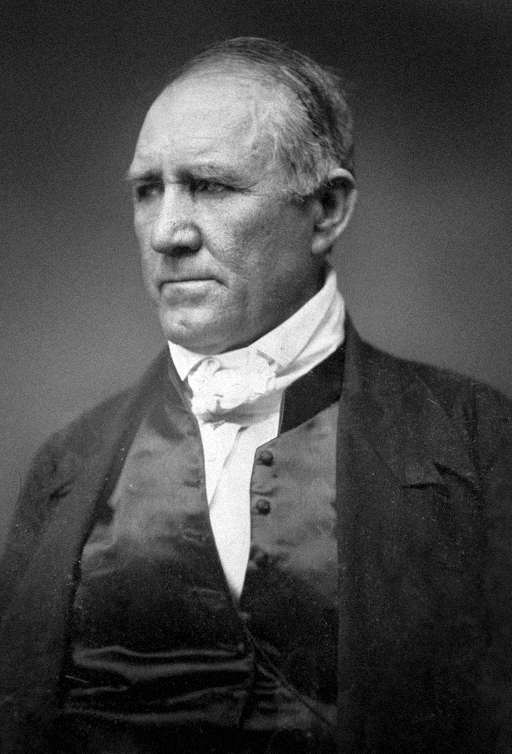
The next day, after going home to sleep, he was back at Capitol Hill working with other senators on legislation. As chair of the Militia Committee, he is a very busy man! During a meeting with one of his fellow senators, he found out that fellow Democratic Senator Stephen Douglas of Illinois was planning to introduce a bill that would organize the Nebraska Territory. This concerned Houston, as he knew what the implication of this bill would be.
Finally, today Senator Douglas introduced the bill on the floor of the senate. I remember him saying the following:
“Mr. President, the Committee on Territories, to which was referred the bill to organize the Territory of Nebraska, has given the subject the serious and deliberate consideration which its great importance demands; and I beg leave on behalf of the committee, to report back the bill to the senate, with various amendments, accompanied by a special report. I move that the report and bill be printed for the use of the Senate.”
The motion was seconded by Senator Augustus Dodge of Iowa, and five thousand copies of the bill, all amendments, and the report were ordered to be printed for the Senate. Houston was not pleased with the bill, even though it was proposed by another Democrat.3
January 23
Senator Douglas introduced a revised version of the bill today in the Senate.4
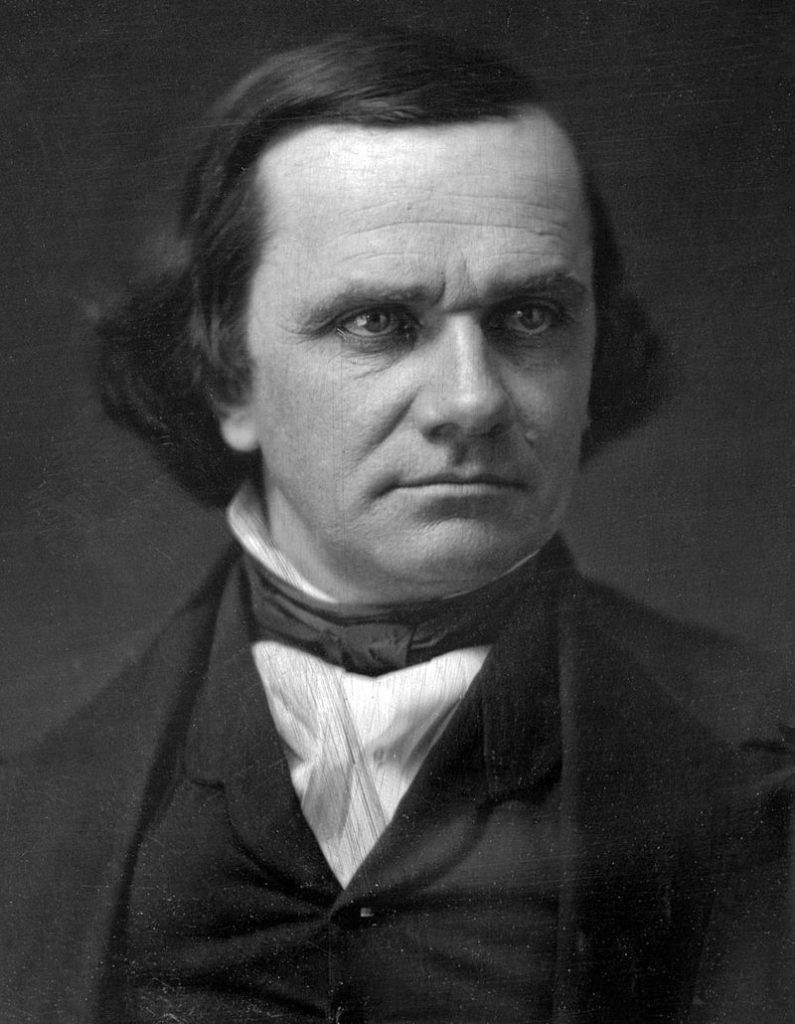
January 31
Today, Senators Houston, Thomas Jefferson Rusk (TX-D), Judah P. Benjamin (LA-W), and John Slidell (LA-D) boarded a train headed from DC to Marshall, Texas. Marshall is special because on February 14, it will be linked by telegraph to New Orleans, LA. This connection means that Texas will be linked with the rest of the United States by telegraph. The Senators were joined by their wives Margaret Lea Houston, Mary F. Cleveland Rusk, Natalie Bauché de St. Martin Benjamin, and Mathilde Deslonde Slidell.5
February 3
Around noon today, Senator Benjamin asked Senator Houston if he could trade one of his bills for some change so that he could leave a tip for the man that had been serving them their drinks. Senator Houston grabbed me and a few other quarters and swapped them for some dollar bills. Later on, when Senators Benjamin and Slidell were talking with their wives, they were discussing a restaurant they both liked in New Orleans.
After the wives went to bed, Senators Benjamin, Slidell, and Rusk met up for a secret meeting to discuss their support for the Kansas-Nebraska Act. They knew from the beginning that Senator Houston was against it, so they made sure that he didn’t find out about the meeting. Among the things they discussed were the specifics of the bill, especially regarding what the borders for the new territories would be. They knew this would be fairly easy to get through the Senate. Senator Douglas carries much weight as chair of the Senate Territories Committee. However, they knew that this would be especially difficult to get through the House. The Democrats may have a majority in both chambers, but there were a lot of northern Democrats who would have ideological difficulties with the bill.
Another problem would be that northern Democrats might not support the bill. It would not be easy for Douglas to sway them in his favor. Northern Whigs were a no-go from the start. Douglas would need to ensure that all Southern Democrats would support this bill, as this would directly affect them, as they represent slave states. This bill was very much pro-slavery, something Northern Democrats would not be too eager to support.6
February 10
The train arrived in Houston this afternoon. Everyone would be staying at Senator Houston and his wife’s home for the night, and then in the morning, they would head out to Marshall for the linking ceremony. No political talk was allowed at the dinner table that night, and surprisingly that rule held! Among the topics discussed were music, history, and the city of Houston itself! However, after dinner was when shop talk began among all four Senators. The wives remained in the kitchen, cleaning (and drinking too I think), while the men retired to Senator Houston’s private study for fine cigars and a bottle of fine Tennessee whiskey (given to Senator Houston when he became governor of Tennessee). While the other Senators drank the whiskey, Senator Houston tapped into his secret stash of bitters that Margaret Lea hadn’t found yet. This was where the magic happened. The four men had a spirited (both the attitude and the alcohol) conversation that went into the night.7
February 14
The last few days have been fairly busy. In the morning, the four Senators and their wives, all hungover from the night before, got on a train that would take them to Marshall, Texas for the event. It took one-and-a-half days to get there. We got there right in time for the ceremony, which was rather boring, yet important. Afterward, all eight guests boarded a train back to Houston. While Margaret Lea boarded a train back to Nacogdoches, Texas, Natalie Bauché and Mathilde Deslonde boarded a train back to New Orleans, and the four senators boarded a train back to DC.8
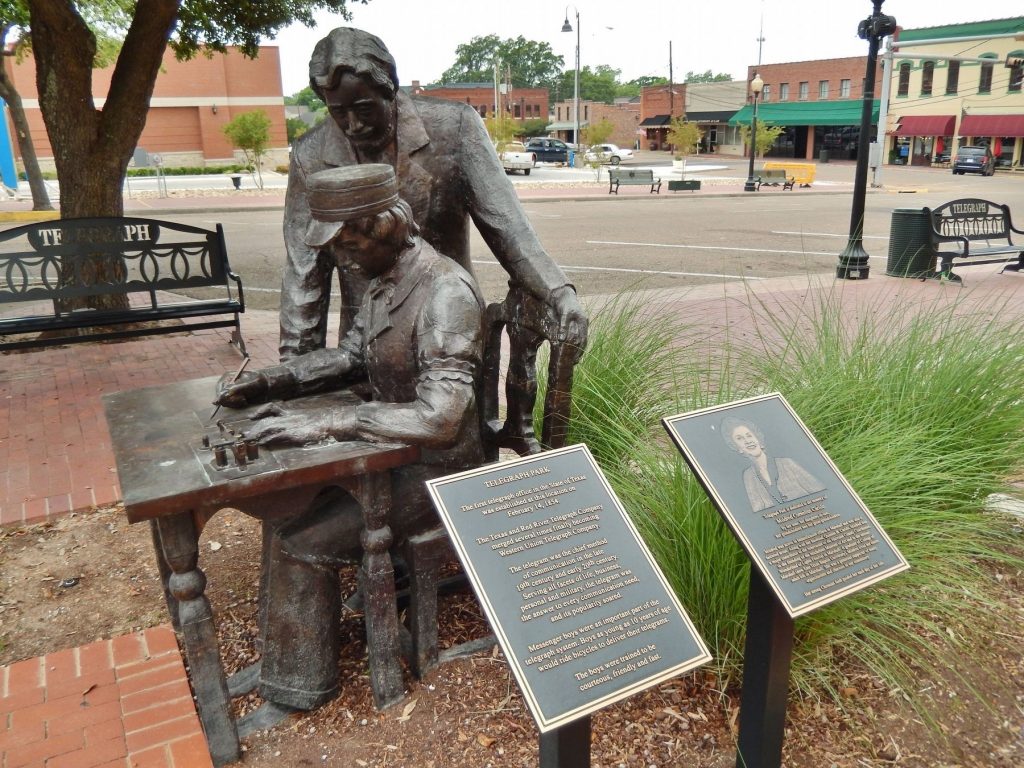
February 21
The four senators made it back to DC today. There seemed to be a mix-up, and Senator Rusk picked up Senator Benjamin’s coin bag. Rusk went back to his office, where his staff caught him up on what he had missed over the last three weeks. There was a lot for him to catch up on, as he is Chair of the Senate Post Office and Post Roads Committee. I was handed off to a staffer who ran the bag to Senator Benjamin’s office and get Senator Rusk’s back. But, the staffer decided to stop by the Members’ refectory first (he knew one of the employees from the restaurant that ran the refectory), and “Senator Benjamin” treated him to an apple. The staffer gave me to the cashier with a nickel and I was put in the register box (which may be bigger than the coin bag, but it’s not as fun!) A few minutes later, I got grabbed from the register box and was given to someone who I didn’t quite recognize. I overheard someone call for him, “Congressman”! When he caught up to the man, he asked him what he thought of Secretary McClelland’s report on the Indian Disputes. I then realized this must be Congressman James Lawrence Orr, a democratic Congressman from South Carolina, and chairman of the House Indian Affairs Committee.
The Congressman had gone and grabbed some lunch to take to his office so he could work on some legislation. While on the way back to his office, they discussed the Kansas-Nebraska Act, including the revised bill that was introduced in the Senate on January 23rd. “I’ve been talking to my staffer friends on the Senate side, and it looks like the bill could pass in as little as two weeks,” said the House staffer talking to Congressman Orr. While this was good news to Orr, he knew that it would be more difficult to pass in the House. Orr knew that he needed to talk to his friends about this, and see what they could do to both make sure that the Act passed in the Senate quickly, and make sure that it isn’t delayed too much in the House. When Orr got back to his office, he told his Chief of Staff to secretly set up a meeting with Senator Douglas (Chairman of the Senate Territories Committee), and the standard-bearer for the Act in the Senate), Democratic Congressman William Alexander Richardson of Illinois (Chairman of the House Territories Committee), Democratic Congressman Alexander Stephens of Georgia, and himself. Preferably in the evening, when no one would be around. Definitely in Orr’s office.9
February 23
Tonight, Congressman Orr met with Congressmen Richards and Stephens, and Senator Douglas to discuss the Kansas-Nebraska Act. Over a round of four-way patience (the four each playing their own game of patience), they discussed the hottest piece of legislation on the market. They played for money, of course. The legislators all emptied out their wallets and coin bags onto the middle of the table. Each member shuffled a deck of cards and then gave it to the member next to them. After that, whichever member finished the fastest won the pot. First Richards won, then Douglas, then Orr, then Stephens again, then Orr again, then Douglas again, then Richards again, then Orr again, then Orr again, then Stephens again, then Richards again, then Richards again, then Stephens again, then Orr again, then Douglas again, then Douglas for the last round.
While they were playing, they discussed how different House members might vote on the bill. Southern Democrats wouldn’t be a problem, most Southern Whigs should vote for it, while not a single Northern Whig would support it, and roughly half of Northern Democrats should vote in favor. Douglas chimed in that it should pass in the Senate, although it wouldn’t be easy. He knew that Senator Houston would be a problem, as well as Senators Salmon Chase (FS-OH), William Seward (WH-NY), and Charles Sumner (FS-MA). They carry a lot of weight in the Senate, and they could make the vote a lot closer if they tried. By Richards’ count, the bill could pass in the House by ten to fifteen votes. Douglas estimated at least twenty in the Senate.
They all agreed that they needed to get their house in order and make sure this bill passed in both chambers by the summer; that way the Non-Voting delegates could be voted in during the midterms in November (and they would likely be Democrats). Senator Douglas knew that he’d need to have a meeting similar to this with other Senators he knew that were strong supporters of the bill, that way he could solidify its passage when it came up for a vote. He said that he could meet with Senator Augustus Dodge of Iowa, a fellow Democrat, and chairman of the Senate Public Lands Committee. He could also talk to Senator James Murray Mason of Virginia, another Democrat, and chair of the Senate Foreign Relations Committee, as well as to Senator Robert T. Hunter, Democrat from Virginia and Chair of the Senate Finance Committee, and Senator Andrew P. Butler, another Democrat and Chair of the Senate Judiciary Committee. After all, he lived with all of these men except for Senator Dodge.
With this being said, the men adjourned for the evening and retired to their homes. While Douglas was grabbing all the coins, he dropped me, and I fell into a crack in the ground before he noticed I was gone. After he left, Congressman Stephens picked me up and put me in his coin bag. Congressman Stephens took me home for the night.10
February 24
Today, Congressman Stephens went straight to his office to look over letters from constituents, and legislation given to him by his staff for his review, after which, he went to the House floor to observe the proceedings for the day. Items that were on the agenda for the day included the San Francisco disaster, communications from the departments of Treasury, War, Commerce, and the Navy, a motion to allow Jose Manuel Gallegos to become the Representative for the territory of New Mexico, and a report from the Committee on Public Lands. All in all, a fairly normal day in the House. On the San Francisco disaster, a Democratic Congressman called for a select five-member committee to investigate the steamship incident.1112
The Lake Ontario communication was additionally referred to the House Commerce Committee. There was then a short discussion as to whether a certain bill should be referred to the Committee on Private Land Claims or the Committee on Public Lands. At the request of Mr. Sage (W-NY), the bill was referred to the Judiciary Committee. The report from the Committee on Public Lands was read by Congressman John Taylor (W-OH), it read – “Resolved, That the committee heretofore appointed to inquire into the expediency of amending the Constitution of the United States, in relation to the mode of electing a President, be, and the same is hereby, instructed further to inquire into the expediency of limiting the term of service of the President of the United States to one term, and making him therefore ineligible to the office of President.” Almost immediately, Congressman John Davis (D-IN) objected to the introduction of the resolution and called for the regular order of business.13
After this, the debate went on for quite some time. Congressman Stephens eventually left, as he had no stake in the matters being discussed. He decided to go to the Members’ refectory to get something to eat before he went back to his office to catch up on things. He had thought of a way to ensure the Kansas-Nebraska Act passed in the House with no problem at all, and if he could get to his office, he could check something that could help him. When he got to the register, he gave the cashier some change, and the cashier dropped me between the counters. He said he’d get me later but he forgot.
March 4
After days of fending for myself against a spider, a mouse, and whatever that other thing was *shiver*, someone that was cleaning in between the counters found me, at last, yesterday, glorious salvation! He put me right in the cash register box, where I was soon given as change to Senator John Bell (W-TN). Seeing that noon was approaching, he made his way quickly to the senate chamber. As he was entering the chamber, Rev. Henry Slicer gave the opening prayer at noon exactly. After that, the journal from the day before was read and approved. After that, President Pro Tempore David Atchinson (D-MO) read a report from the Secretary of the Interior, in which the Secretary answers a resolution of the Senate “requesting a statement of the amount of money received and expended by Luther Blake, late agent for the removal of the Indians from Florida, as such agent, with the objects for which it was expended, and the number of Indians removed by him.” Following this, the report was ordered to lie on the table and be printed.
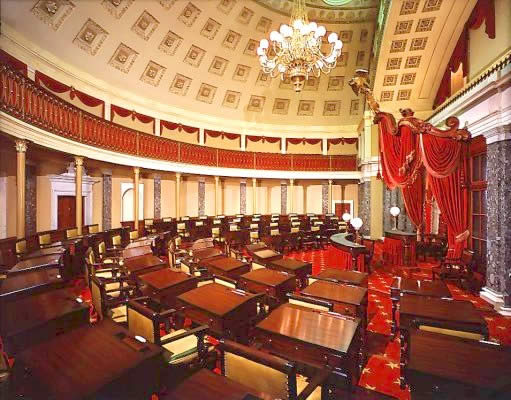
Then shortly after, Senator John Pettit (D-IN) said on the floor, “This being private bill day, I have a number of bills that hang on me and their friends like an incubus, which I would like to have taken up and considered. They are plain matters, which will lead to no debate. I suppose we shall go on with private business until one o’clock. I hope that we may have an hour, if necessary, to pass private bills before we take up the Nebraska bill.” After which, Senator Pettit motioned for the Senate to take up a bill authorizing a patent to be issued to Peter Poncin for “certain lands therein named,” concerning a small tract of land in Minnesota. The bill was read for a third time, then promptly passed by the Senate. After that, two more similar bills were passed, regarding Conrad Wheat Jr. of Missouri, and Samuel Prioleau of South Carolina, both landowners. After all the proposed bills were passed, Senator George Badger (W-NC) expressed that he would not be pursuing the resolution he had proposed the day before – “Resolved, That the resolution assigning every Friday for the consideration of private bills be suspended for this day.” He also said that due to Senator Bell wishing to address the Senate today, he was actually against the proposition. The resolution was agreed to.
After the resolution was agreed to, several Senators presented petitions given to them by their constituents. Any petitions that related to the Kansas-Nebraska Act or the Missouri Compromise were ordered to lie on the table, while the rest were referred to the proper committee. Then two Standing Committees gave their reports, Public Lands, and Foreign Relations. These bills were in reference to a portion of public lands to aid in the construction of the Indiana and Illinois Central railway, and a petition of remuneration for loss of time and expenses for J. K. Cooke while he was under an appointment of the President as Consul of the United States at Xebara, in the Island of Cuba. The Governor-General Juan Gonzales de la Penzuela had refused to recognize Cooke as such. Cooke asked to be discharged, which was agreed upon by the Senate.
After all this business was taken care of, the fun began. With adrenaline coursing through the veins of every Senator, every staffer, every observer in the gallery, and me, the bill to organize the Territory of Nebraska was read a third (and hopefully final) time.
Senator Lewis Cass (D-MI) started off by thanking Senator Bell for letting him speak for a moment. He then proceeded to record his vote in favor of the bill’s final passage. He then ordered the yeas and nays as such. Senator Douglas then stood up to say that several Senators were forced to leave “from indisposition” under the impression that the vote would not happen yesterday. After which, Senator Cass ordered the yeas and nays once again. Then, the debate ensued.
Senator Bell was the first to speak, rising to his podium to speak against the bill. In a fiery speech, he denounced the bill and everything that it stood for. Senator William Dawson (W-GA) spoke next, rising to his podium to speak in favor of the bill. He urged other Senators to vote in favor of the bill, saying that it is what is best for the country. Senator Moses Norris Jr. (D-NH) was the next to speak in favor of the bill. Senator Benjamin Wade (W-OH) spoke next, calling for his fellow Senators to vote against the bill. Senator Pettit was the next in line to speak, speaking in favor of the bill. He said the following:
“If Mr. Jefferson had said that all men ought to have been created equal, I would have raised no dispute, but when he said that they were created equal, I said, that instead of that being a self-evident truth, it was a self-evident lie; that there was no truth in it; that the negro in Africa and the free-born American are not created equal; that the serf of Russia, under the Autocrat, is not the equal of his master, however it may have been intended or designed.”14
After that, he discussed the Constitution, and God Almighty himself. After he finished, Senator Isaac Toucey (D-CN) spoke against the bill. Then, Senator William P. Fessenden (W-ME) stood to speak against the bill. Ever since he was elected to the Senate, he has been an outspoken critic of the bill. He flat-out denounced slavery and took shots at all those who care for it. He concluded his speech by saying:
“Such, sir, are my views in reference to this matter. I have not spoken them so much for the Senate as for the purpose of giving expression to what I believe to be the sentiments of those I have the honor to represent on this floor. Whether right or not time only can decide, and I am willing to abide that decision.”15
Senator John Weller followed, beginning by thanking Senator Fessenden for his speech. Senator Weller then talked about meeting Senator Fessenden when they were both in the House, and that the two gentlemen disagreed on slavery just as much now as they did then. After which, Senators Douglas and Houston got into it about the need to take the vote last night, as had been promised by Senator Douglas. Instead of summing up the bill as he had promised, Senator Douglas let other supporters of the bill speak instead, therefore prolonging the coming vote. Senator Douglas then stood to his podium to give a final speech in favor of the bill. He then got into a discussion with Senator Seward, in which they discussed several aspects of the bill. After Senator Douglas spoke for a rather long time, Senator Houston took to his podium. In one of the most eloquent speeches of the night, Senator Houston, the man who I would not be here without, discusses how Texas will be harmed by this bill, why this bill is wrong (both for the country and for democracy). Personally, my favorite line of his is:
“I cast no reflections on gentlemen either for its introduction or for its support; but I deprecate the consequences which will flow from it. I have conversed with several Senators, and I have never heard the first who would not admit that it was an unfortunate and ill-advised measure. The venerable and distinguished Senator from Michigan, the other day, in his speech, declared, in substance, that he thought it was an unfortunate circumstance that it had ever been introduced into the Senate, although it meets with his approbation when it is here. And now, when he who has been in the councils and transactions of this country for fifty years, who has witnessed all the vicissitudes and mutations through which the country has passed, who has been in the most important scenes of the Union, when he does not recognize it as a healing and welcome measure, I ask Senators if I err in resisting it? They say it is here. It is here; and if I had the power, I would kick it out. What, if a measure unwholesome or unwise is brought into the Senate, and it comes from the party of which I am a member, and its introduction is an error, is it not my duty to correct that error as far as I possibly can? Sir, I stand here for that general purpose. My constituents send me here for that purpose.”16
I was so shocked to hear those words. He is willing to stake his career if it means striking down a bad piece of legislation because that is what his constituents elected him to do—preserve the Republic. Later on, he said:
“If this bill passes, will there be no shock? Depend upon it, Mr. President, there will be a tremendous shock; it will convulse the country from Maine to the Rio Grande. The South has not asked for it. I, as the most extreme southern Senator upon this floor, do not desire it. If it is a boon that is offered to propitiate the South, I, as a southern man, repudiate it. I reject it. I have none of it.”17
He then spoke for a considerable amount of time, building off of what he had said. Finally, he concluded by saying the following:
“The proud symbol above your head [the eagle] remains enshrouded in black, as if it deplored the misfortune which had fallen upon us, or as a fearful omen of future calamities which await our nation, in the event this bill should become a law. Above it, I behold the majestic figure of Washington, which presence must ever inspire patriotic emotions, and command the admiration and love of every American heart. By these associations, I adjure you to regard the contract once made to harmonize and preserve this Union. Maintain the Missouri compromise! Stir up not agitation! Give us peace! This much I was bound to declare, on behalf of my country, as I believe, and I know on behalf of my constituents. In the discharge of my duty, I have noted fearlessly. The events of the future are left in the hands of a wise Providence; and, in my opinion, upon the decision which we make upon this question, must depend union or disunion.”18
At 4:50 am, a tired Houston sat down in his chair, in this magnificent chamber, under the portrait of George Washington, watched unfurl what he was sure to be the first of many turmoils this union would face in the near future.
Senator Dodge stated – “The question is on the passage of the bill, and on that question the yeas and nays have been ordered.” After which, Senators Douglas, James, and Dawson stated that if certain Senators had not been compelled to leave, they would have gladly voted for and against the bill. After this, Senator Dodge called the roll.
Mr. Adams (D-MS) – yea
Mr. Atchinson (D-MO) – yea
Mr. Badger (W-NC) – yea
Mr. Bayard (D-DE) – yea
Mr. Bell (W-TN) – nay
Mr. Benjamin (W-LA) – yea
Mr. Cass (D-MI) – yea
Mr. Clay (D-AL) – yea
Mr. Chase (FS-OH) – nay
Mr. Dawson (W-GA) – yea
Mr. Dixon (W-KY) – yea
Mr. Dodge (D-IA) – yea
Mr. Dodge (D-WI) – nay
Mr. Douglas (D-IL) – yea
Mr. Evans (D-SC) – yea
Mr. Fessenden (W-ME) – nay
Mr. Fish (W-NY) – nay
Mr. Fitzpatrick (D-AL) – yea
Mr. Foot (W-VT) – nay
Mr. Geyer (W-MO) – yea
Mr. Gwin (D-CA) – yea
Mr. Hamlin (D-ME) – nay
Mr. Houston (D-TX) – nay
Mr. Hunter (D-VA) – yea
Mr. James (D-RI) – nay
Mr. Johnson (D-AR) – yea
Mr. Jones (D-IA) – yea
Mr. Jones (W-TN) – yea
Mr. Mason (D-VA) – yea
Mr. Morton (W-FL) – yea
Mr. Norris (D-NH) – yea
Mr. Pettit (D-IN) – yea
Mr. Pratt (W-MD) – yea
Mr. Rusk (D-TX) – yea
Mr. Sebastian (D-AR) – yea
Mr. Seward (W-NY) – nay
Mr. Shields (D-IL) – yea
Mr. Smith (W-CN) – nay
Mr. Slidell (D-LA) – yea
Mr. Stuart (D-MI) – yea
Mr. Sumner (FS-MA) – nay
Mr. Thompson (A-KY) – yea
Mr. Thompson (D-NJ) – yea
Mr. Toucey (D-CN) – yea
Mr. Wade (W-OH) – nay
Mr. Walker (D-WI) – nay
Mr. Weller (D-CA) – yea
Mr. Williams (D-NH) – yea
The yeas were 37, and the nays were 14. After this, Senator Douglas motioned for the (newly amended) title of the bill to be read: “A bill to organize the Territories of Nebraska and Kansas.” Then at 4:55 am, the Senate adjourned. Senator Bell walked over to Senator Houston, flipped me in the air, and said “how the fuck did we let this happen.”19
. . .
May 30
After a long and arduous uphill battle in the House, the Kansas-Nebraska Act was finally passed on May 25th. Today, President Franklin Pierce (D-NH) signed the bill into law.20
June 10
Senators Thomas Pratt (W) and James Pearce (W) attended the graduation ceremony for the first class of the United States Naval Academy in Annapolis, in their home state of Maryland.21
. . .
July 12
Senators William Seward, Benjamin Wade, Hannibal Hamlin, William Fessenden, Charles Sumner, and Solomon Foot, along with a large number of Congressmen met with a few leaders from the newly formed Republican Party. The convention just happened a few days ago in Jackson, Michigan. Unfortunately, none of the Senators could make it, and neither could most of the Congressmen that were present as well. Among the topics discussed was a game plan for the midterms coming up in November, and for the presidential election coming in 1856. Lots of northern Whigs and some northern Democrats were outraged by the Kansas-Nebraska Act, and especially with Senator Douglas, as he had betrayed his own party to advance his agenda. This new Republican party was very much opposed to slavery as a whole. Northern Whigs also joined this new Republican party, which was of course fueled by the outrage of Northern Democrats.22
. . .
October 17
Yesterday, a former Whig Congressman from Illinois gave a speech in Peoria against slavery. Senator Douglas was in attendance. The former Congressman spoke out against slavery here in the United States, the Kansas-Nebraska Act, and popular sovereignty. He signed my journal. Looks like his name is Abraham Lincoln.23
November 25
While on a carriage ride with Senate Pro Tempore David Atchison, I was accidentally thrust from the carriage and landed in a sewer grate.
December 1
It’s really cold in here. I don’t know how much longer I can last. It’s dirty, and it smells.
December 3
The end is near, I can feel it. If this is to be the last thing I write in my journal, let it be then that I…
I would like to start off by thanking Dr. Bradford Whitener for letting me explore this unique idea for an article. He took a chance on me, and I’m truly hoping it paid off. I would also like to thank Dr. Diane Duesterhoeft in Blume Library for assisting me with my research for the article. I would also like to thank Amanda Uribe for helping me take my initial idea and crafting it into a successful project proposal. I would also like to thank Alamo Heights Coin Shop, for selling me the quarter that went on to become the inspiration for this story. Finally, I would like to thank Dr. Céline Jacquemin, for being the first to tell me about the StMU Research Scholars Project (back when it was still known as StMU History Media). This article has been a semester in the making, and I genuinely hope you enjoyed reading it. I know that I certainly enjoyed writing it!
- While this event is clearly imaginary, this took place at the US Mint in Philadelphia, which you can find out more about here. ↵
- While Sam Houston was actually in Washington DC on January 3rd (this being the first day of the 33rd Congress), the specifics of this entry are merely imaginary. Sam Houston was very much an alcoholic though. “Sam Houston,” accessed August 24, 2021, http://www.famoustexans.com/samhouston.htm. ↵
- “A Century of Lawmaking for a New Nation: U.S. Congressional Documents and Debates, 1774 – 1875,” accessed September 7, 2021, https://memory.loc.gov/cgi-bin/ampage?collId=llcg&fileName=033/llcg033.db&recNum=2. ↵
- “A Century of Lawmaking for a New Nation: U.S. Congressional Documents and Debates, 1774 – 1875,” accessed September 7, 2021, https://memory.loc.gov/cgi-bin/ampage?collId=llcg&fileName=033/llcg033.db&recNum=2.. ↵
- While the events listed here are imaginary, Texas was linked to the rest of the United States on February 14, 1854, which you can learn about here. ↵
- While these specific events never happened, this scene sets up a showdown between Northern and Southern Democrats and Whigs over the Kansas-Nebraska Act that will be explored later on. ↵
- While there is no record of the Senators and their wives attending this event, and this is all imagery, it is still an important piece of American history, as it cemented the then-permanence of the telegraph. ↵
- Again, this is entirely imagery. ↵
- While these events are imagery, and purely fictional, here is a list of all House and Senate Committee Chairs from the 33rd (and then-current) Congress, which took place between 1853 and 1855. ↵
- While these events are imagery, and purely fictional, here is a list of all House and Senate Committee Chairs from the 33rd (and then-current) Congress, which took place between 1853 and 1855. ↵
- “Wreck of the San Francisco • New York Times, Jan. 16, 1854,” accessed December 7, 2021, https://penelope.uchicago.edu/Thayer/E/Gazetteer/Places/America/United_States/_Topics/history/_Texts/newspapers/NY_Times/1854/January_16/Wreck_of_the_San_Francisco/survivors_accounts*.html.. ↵
- On the communications, the following communications were sent to the House, and read aloud by the Speaker to be entered into the congressional journal. The five communications are as read:
“1. A communication from the Treasury Department, transmitting, in compliance with a resolution of the House of the 13th instant, a statement showing the original cost of each custom-house, including expenditure for sites as well a construction; also the entire annual expenditure for the last three years, so arranged as to show at what points the expenditures exceeds the returns. 2. A communication from the War Department, transmitting, in compliance with various acts of Congress, a list of persons employed in that Department other than officers of the Army, during the year 1853. 3. A communication from the War Department, transmitting, in compliance with a resolution of the House of the 13th instant, a report of Topographical Engineers, in reference to a survey of Twelve Mile Creek, Lake Ontario. 4. A communication from the War Department, transmitting a statement showing what contracts have been made under the authority of that Department during the year 1853. 5. A communication from the Navy Department, transmitting three hundred copies of the Navy Register for the year 1854.” All the communications were laid upon the table and ordered to be printed. ↵
- “A Century of Lawmaking for a New Nation: U.S. Congressional Documents and Debates, 1774 – 1875,” accessed September 7, 2021, https://memory.loc.gov/cgi-bin/ampage?collId=llcg&fileName=033/llcg033.db&recNum=2.. ↵
- “A Century of Lawmaking for a New Nation: U.S. Congressional Documents and Debates, 1774 – 1875,” accessed November 6, 2021, https://memory.loc.gov/cgi-bin/ampage?collId=llcg&fileName=036/llcg036.db&recNum=8. ↵
- “A Century of Lawmaking for a New Nation: U.S. Congressional Documents and Debates, 1774 – 1875,” accessed November 6, 2021, https://memory.loc.gov/cgi-bin/ampage?collId=llcg&fileName=036/llcg036.db&recNum=8. ↵
- “A Century of Lawmaking for a New Nation: U.S. Congressional Documents and Debates, 1774 – 1875,” accessed November 6, 2021, https://memory.loc.gov/cgi-bin/ampage?collId=llcg&fileName=036/llcg036.db&recNum=8. ↵
- “A Century of Lawmaking for a New Nation: U.S. Congressional Documents and Debates, 1774 – 1875,” accessed November 6, 2021, https://memory.loc.gov/cgi-bin/ampage?collId=llcg&fileName=036/llcg036.db&recNum=8. ↵
- “A Century of Lawmaking for a New Nation: U.S. Congressional Documents and Debates, 1774 – 1875,” accessed November 6, 2021, https://memory.loc.gov/cgi-bin/ampage?collId=llcg&fileName=036/llcg036.db&recNum=8. ↵
- “A Century of Lawmaking for a New Nation: U.S. Congressional Documents and Debates, 1774 – 1875,” accessed September 7, 2021, https://memory.loc.gov/cgi-bin/ampage?collId=llcg&fileName=033/llcg033.db&recNum=2. ↵
- See May 30 under events. “1854 in the United States,” in Wikipedia, March 20, 2021, https://en.wikipedia.org/w/index.php?title=1854_in_the_United_States&oldid=1013247263.. ↵
- It is more than likely that these Senators did not attend. Although, it is highly likely that members of the Senate Committees on Military Affairs, Militia, and Naval Affairs attended, as well as members of the House Committees on Military Affairs, Militia, and Naval Affairs. “USNA Timeline,” accessed December 7, 2021, https://www.usna.edu/USNAHistory/History.php. ↵
- While this event is completely fictional, and pure imagery, the convention did happen, and these Senators and Congressmen were more than likely briefed, if they didn’t personally attend of course. ↵
- Mailing Address: 413 S. 8th Street Springfield and IL 62701 Phone: 217 492-4241 Contact Us, “Peoria Speech, October 16, 1854 – Lincoln Home National Historic Site (U.S. National Park Service),” accessed December 7, 2021, https://www.nps.gov/liho/learn/historyculture/peoriaspeech.htm.. ↵
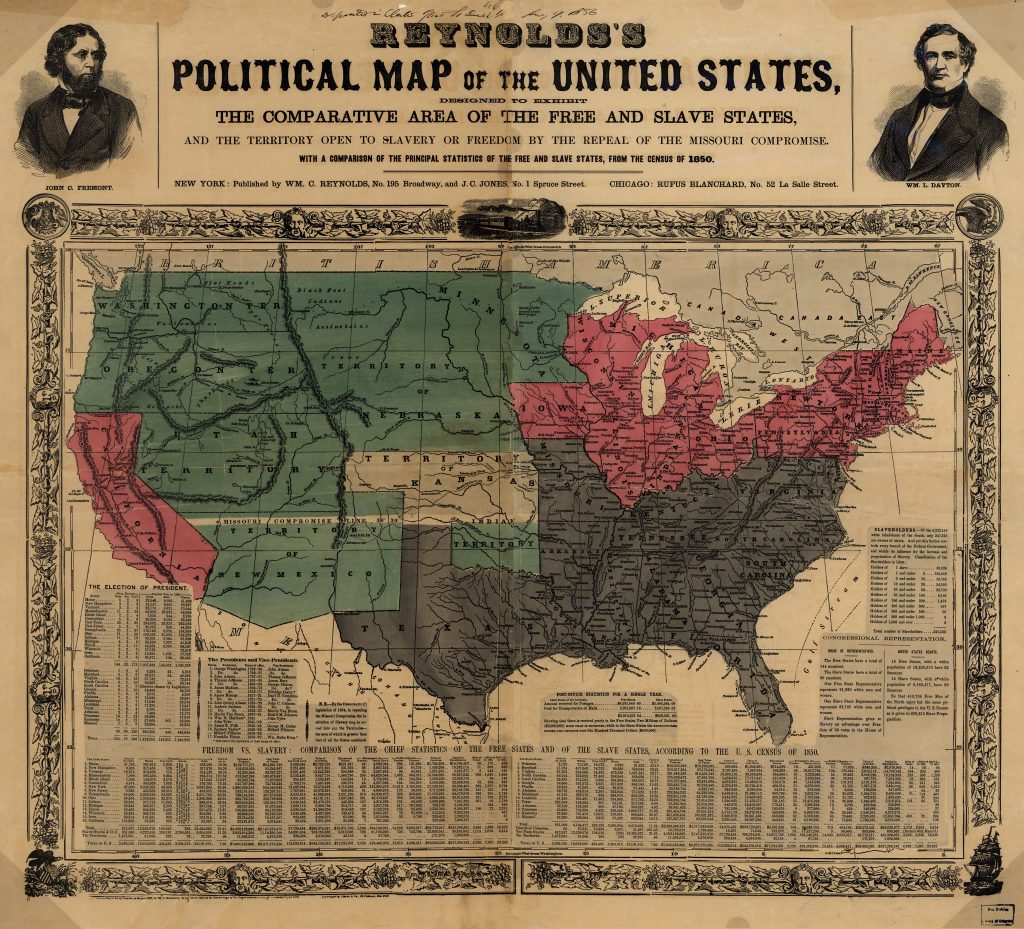
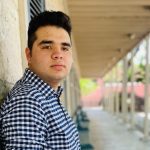


5 comments
Mateo Ortega-Rios
Goodness! This article is by far one of my favorites, the way the article was formatted was able to keep the reader in the article at all times. The dates added and the events in order really gave this whole article an bonus because I was able to see what was going on at all times. When you used the yeas and nays, I really liked that because it made it seem like I was there when it was happening.
Seth Roen
I just love the unique style of the article that you made, telling the story of a quarter as it saw a pivotal moment in American History. For I do agree that coins do witness history both anicent and modern, and all of them wanting for their stories to be heard. It would be cool if history was told thought the eyes of objects that no one thinks of anymore.
Jacob Adams
Although hard to follow at times, this article was entertaining to read. I liked how you put citations on every journal entry, it really made it clear that these events really happened. I think this format really lends itself to the reader who wants to be engaged with the reading. One of my favorite books is Dracula, which has a similar journalistic writing style. I really loved the ending as well, it was almost poetic.
Carlos Hinojosa
This was probably most unique article I have read on this website so far. The format and style of writing you were going with was what actually grabbed my attention. The way you told this story on the Kansas-Nebraska Act is very interesting and actually helped me understand more clearly on what they were going for while making the Act. Very well-made and a great job. I hope you get an award for this.
Isaac Fellows
Wow, what an interesting way to tell this story. I never knew that a quarter could be so wise and politically knowledgable! In all seriousness, this was an interesting way to tell the story of the Kansas-Nebraska Act. It’s such an interesting topic, especially when trying to compare it to how the Senate operates today in our hyper polarized environment. There’s a good flare of drama and humor and here, so overall… great article!